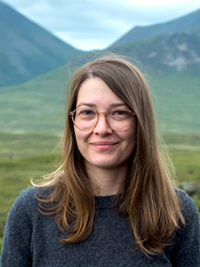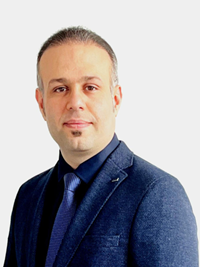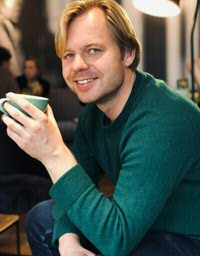Nominations 2022 Gratama Science Award (UG) announced
The nominees for the 2022 Gratama Science Award have been announced: DrYuliya Hilevych (Faculty of Arts), Dr Hamidreza Kasaei (Faculty of Science and Engineering), and Dr Lieuwe Zijlstra (University College Groningen). The award is intended as an incentive for young, promising, and active scientists, who distinguish themselves with innovative, sensational, and socially relevant research. Every year, the University of Groningen and Leiden University alternately grant the award to a staff member. This year, it is the turn of the University of Groningen. The nominees are proposed by their respective faculties and selected by the board of the Groningen University Fund. The board of the Gratama Foundation ultimately selects the winner.
The winner will be announced on 1 July, during the new Ceremony of Merits of the Board of the University of Groningen. The winner will receive an award in the amount of €20,000. The two other nominees will receive €2,500. The awards are intended to be spent on academic work.
About the nominees
Dr Yuliya Hilevych, Faculty of Arts

Yuliya Hilevych (1988) is an assistant professor at the Faculty of Arts. She is conducting historical research into human reproduction, the social history of infertility, and of reproductive technology in Europe. Her research focuses on the human experience and search for meaning, as well as on social institutions and collective action, and shows how a humanities-based approach produces socially relevant results that can lead to innovative solutions to social problems. Dr Hilevych analyses social movements surrounding reproduction and the practice of abortion and relates them to large social issues such as population shrinkage, war, infertility, and childlessness.
In her PhD thesis, she showed that there were different abortion cultures and reproductive practices in Soviet Ukraine, which is extremely relevant for the current debates on the criminalization of abortion in some East European countries. The results of her research on shrinkage and war over the past eight years in eastern Ukraine are particularly relevant in the context of the current war in the country. She is currently writing a monograph on the social history of infertility. In addition, she is also one of the leaders of a large-scale project for Horizon Europe on gender relations and demographic crises in Eurasia.
Yuliya Hilevych is working together with renowned researchers affiliated with the universities of Cambridge, Oxford, and Lincoln. She is an in-demand speaker at universities, research institutes, and in national and international policy circles. Her contributions to the briefing papers of the United Nations in Washington, advice issued to the Ministry of Justice and Security, and media appearances attest to the broad reach of her research.
Hamidreza Kasaei, Faculty of Science and Engineering

Hamidreza Kasaei (1986) is an assistant professor at the Faculty of Science and Engineering and chair of the Robot Learning Lab (IRL-Lab), part of the Autonomous Perceptive Systems (APS) group. His research on data-efficient open-ended machine learning methods has contributed to a breakthrough in cognitive robotics. In addition, he has also made an important contribution to the renewal of the Robotics degree programme, which is attracting a strongly increasing number of students. Kasaei is also a prominent speaker at leading global conferences on robotics and machine learning.
Nowadays, robots are rather capable of completing fixed tasks within a defined environment, however changes in the environment or task require complex, time-consuming, and thus expensive, re-programming by experts. Kasaei initiated the Lifelong Interactive Robot Learning lab, in which robots learn to adapt to new environments, gradually learn new concepts, and learn to communicate with non-expert human users, without any need for re-programming.
His research into two-armed robots that learn to manipulate objects based on visual information has drawn a great deal of international attention. This is leading to the development of a wide range of socially relevant applications, from agricultural robots that can boost productivity to care robots that can lighten the load in the medical sector during a pandemic.
Kasaei has been affiliated with the Computer Vision and Machine Learning lab of Imperial College London and was granted the Robotics: Science and System Pioneers Award in 2019.
Dr Lieuwe Zijlstra

Lieuwe Zijlstra (1983) is affiliated with University College Groningen as assistant professor. He is an interdisciplinary researcher in the new field of experimental philosophy. Lieuwe Zijlstra’s academic career displays both his academically innovative and socially relevant qualities. A typical characteristic of his interdisciplinary research is that he conducts both empirical and philosophical research into topics that are directly linked to social issues, or on our daily life.
In his PhD thesis, he researched whether people are inclined to think that moral judgements are objectively correct or incorrect by combining philosophical research findings with conducting psychological experiments. During his PhD research in Groningen and Ghent, he conducted research at Yale University for a year and a half under the supervision of Joshua Knobe, leader in the experimental philosophy research field. This is a highly demanding field of research. It requires command of conceptual analysis and logic, as well as expertise in empirical research methodology and statistics. Zijlstra is a pioneer in the Netherlands. He is working on academic issues in moral psychology, perceptions of personal identity, happiness and search for meaning, as well as on the topic of moral progress.
In his interdisciplinary lectures at the University College Groningen, he asked students to research the relationship between memory and identity, the subjective experience of happiness in social groups, and the origins of moral judgements.
| Last modified: | 13 June 2022 2.34 p.m. |
More news
-
03 April 2025
IMChip and MimeCure in top 10 of the national Academic Startup Competition
Prof. Tamalika Banerjee’s startup IMChip and Prof. Erik Frijlink and Dr. Luke van der Koog’s startup MimeCure have made it into the top 10 of the national Academic Startup Competition.
-
01 April 2025
NSC’s electoral reform plan may have unwanted consequences
The new voting system, proposed by minister Uitermark, could jeopardize the fundamental principle of proportional representation, says Davide Grossi, Professor of Collective Decision Making and Computation at the University of Groningen
-
01 April 2025
'Diversity leads to better science'
In addition to her biological research on ageing, Hannah Dugdale also studies disparities relating to diversity in science. Thanks to the latter, she is one of the two 2024 laureates of the Athena Award, an NWO prize for successful and inspiring...
